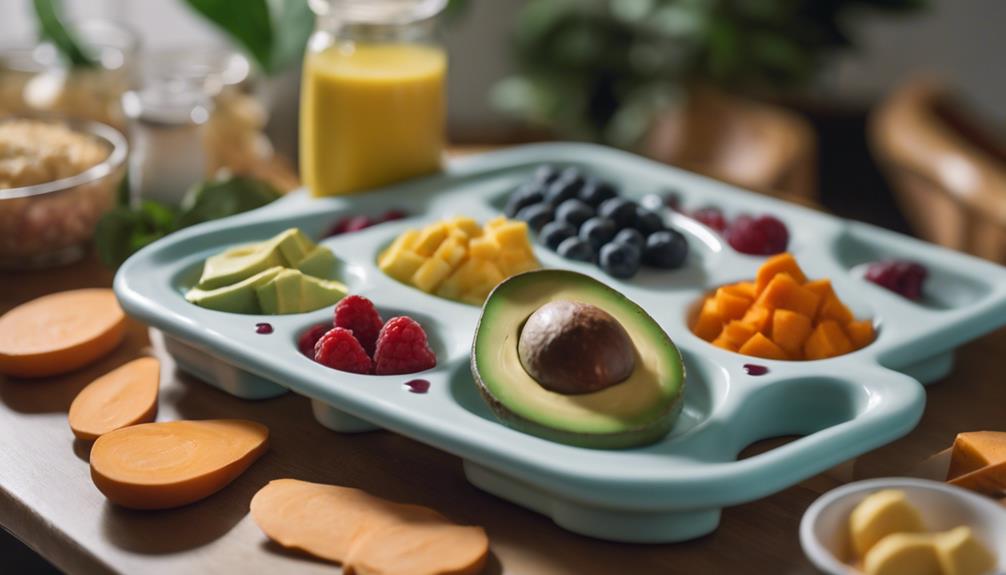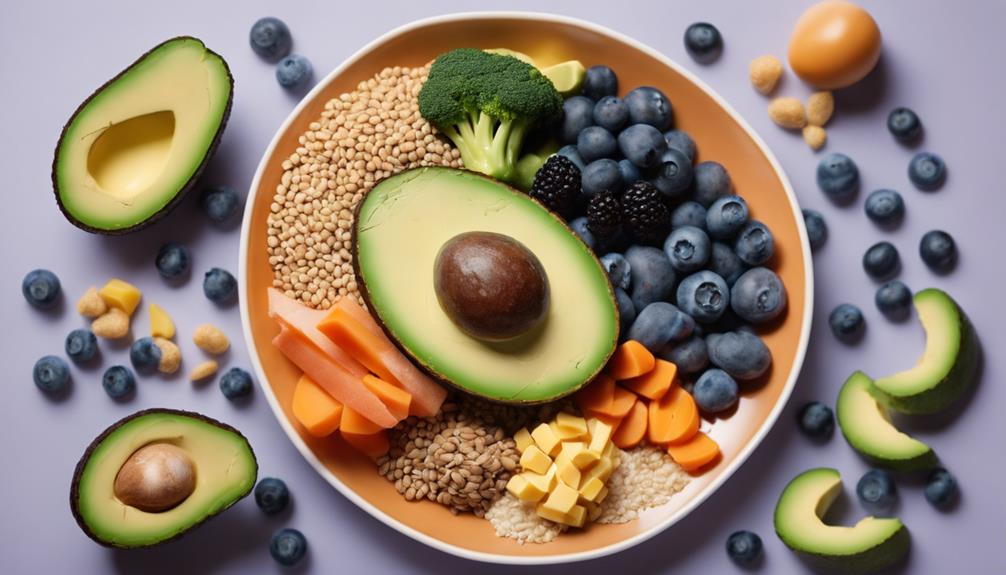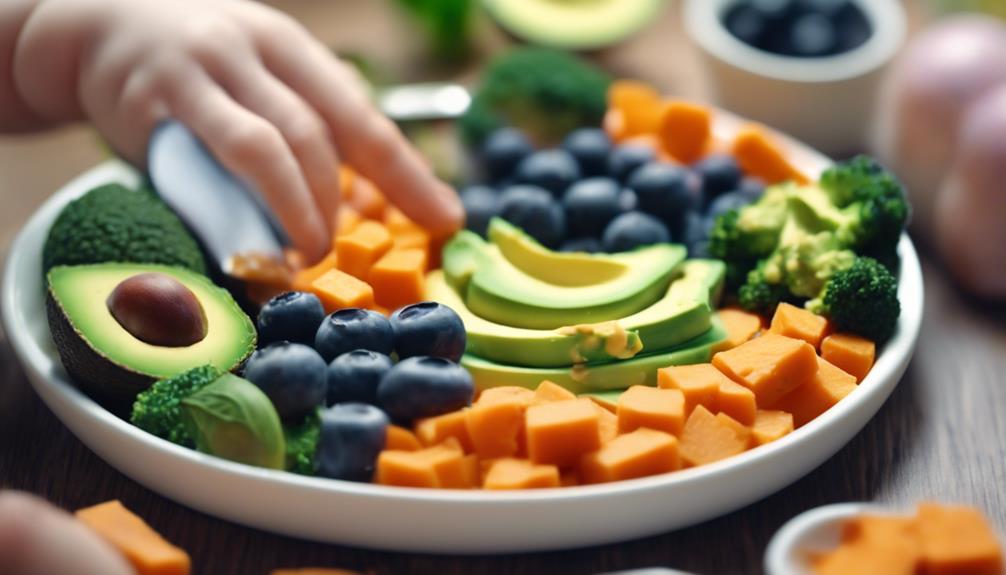Fuel your 1-year-old’s brain development by providing foods packed with nutrients such as salmon, eggs, and whole grains. The Omega-3 fatty acids in salmon and healthy fats in nuts and seeds help cognitive growth, while choline in eggs supports memory development. Opt for high-fiber options like whole grains, fruits, and vegetables to help regulate blood sugar levels, crucial for cognitive development. Calcium-rich dairy products like milk and yogurt assist in the brain’s signaling system. Berries and colorful vegetables packed with antioxidants can protect against oxidative stress. Various nutrient sources like lean meats and avocados contribute to optimal brain development. Keep their brains nourished with these nutrient-rich choices.
Key Takeaways
- Offer nutrient-rich foods like salmon, eggs, and whole grains for brain development.
- Include high-fiber options such as fruits and vegetables to support cognitive growth.
- Provide calcium-rich foods like dairy products to promote brain health.
- Incorporate antioxidant-rich foods like berries and colorful vegetables for cognitive function.
- Ensure a variety of brain-boosting nutrients like Omega-3 fatty acids and choline in the diet.
Nutrient-rich Foods for Brain Development
Include a variety of nutrient-rich foods like salmon, eggs, and whole grains to support excellent brain development in your 1-year-old baby. These brain foods are packed with essential nutrients like omega-3 fatty acids, which are vital for cognitive growth and brain function in toddlers.
Salmon, in particular, is a great source of these fatty acids. Eggs contain choline, a nutrient that aids in memory development. Whole grains provide sustained energy levels needed for proper brain function.
High-fiber Foods for Cognitive Growth
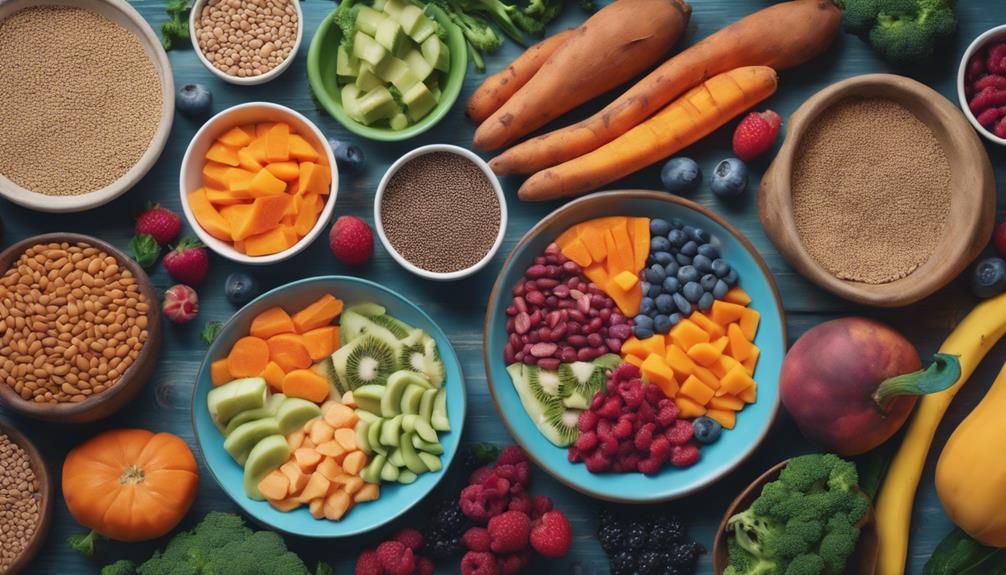
High-fiber foods play a significant role in supporting cognitive growth in your 1-year-old baby. By aiding in digestion and nutrient absorption, fiber-rich options like whole grains, fruits, and vegetables can positively impact brain health.
Including these high-fiber foods in your child's diet can help regulate blood sugar levels and establish healthy eating habits early on.
Fiber and Brain Health
Enhancing your 1-year-old baby's cognitive growth, fiber-rich foods like whole grains, fruits, and vegetables play an essential role in supporting brain health by regulating blood sugar levels and improving cognitive function. Fiber also aids in maintaining a healthy gut, which is closely linked to improved brain development and function in children. Including high-fiber foods such as oats, lentils, and berries in your baby's diet can enhance memory and focus, promoting overall brain health and supporting ideal growth and development. Additionally, fiber plays an important role in digestion and nutrient absorption, which are crucial for proper brain function in young children.
| Whole Grains | Fruits | Vegetables |
|---|---|---|
| Oats | Berries | Broccoli |
| Quinoa | Apples | Spinach |
| Brown rice | Oranges | Carrots |
Benefits of High-Fiber
Supporting your 1-year-old baby's cognitive growth, incorporating high-fiber foods like whole grains, fruits, and vegetables into their diet can have significant benefits. These fiber-rich foods play an important role in promoting healthy digestion and nutrient absorption, which are essential for your baby's overall development. By including whole grains, fruits, and vegetables in their meals, you provide your baby with a diverse array of nutrients necessary for cognitive growth.
Moreover, high-fiber foods help regulate blood sugar levels, preventing energy crashes that could impact your baby's alertness and concentration. Additionally, fiber supports a healthy gut microbiome, contributing to your baby's brain health and development.
Introducing high-fiber foods early on sets the stage for good eating habits and can positively influence your baby's long-term cognitive function. Opt for options like oats, brown rice, and legumes to provide sustained energy for your active baby's brain and body.
Examples of Fiber-Rich Foods
To nourish your 1-year-old baby's cognitive growth, consider incorporating a variety of fiber-rich foods into their daily meals. Foods like whole grains, fruits, and vegetables play an essential role in supporting cognitive development at this stage.
Opt for whole grains such as oats and brown rice, which are rich in fiber and essential nutrients, aiding in healthy brain function. Fruits like apples and bananas, along with vegetables like sweet potatoes, provide a diverse range of vitamins and minerals necessary for your baby's growing brain.
Including these high-fiber foods in your little one's diet can help regulate blood sugar levels, promote healthy digestion, and support a flourishing gut microbiome. By preventing constipation and ensuring an ideal nutrient absorption, fiber-rich foods contribute to enhanced concentration, memory, and overall cognitive function, laying a solid foundation for long-term brain health.
Make sure to offer a balanced mix of these nutritious options to fuel your 1-year-old's cognitive growth and development.
Calcium-rich Options for Brain Health
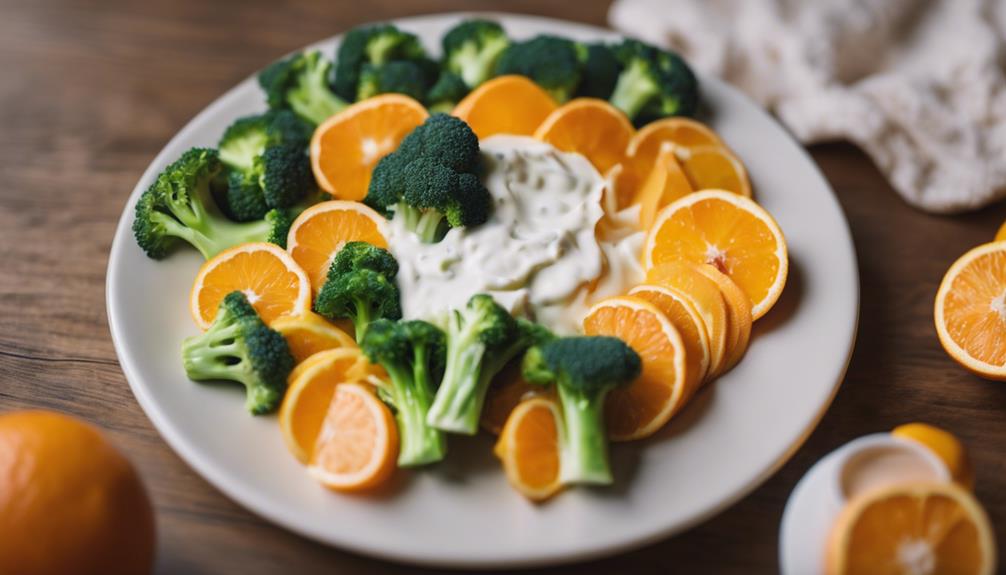
Consider including calcium-rich options like milk, cheese, and yogurt in your 1-year-old's diet to support their brain health and development. These dairy products are excellent sources of calcium essential for brain development in toddlers.
Here are three calcium-rich foods to contemplate:
- Milk: A staple source of calcium, milk is vital for the brain's electrical signaling system in 1-year-olds, supporting cognitive function and overall brain health.
- Cheese: Incorporating cheese into your little one's meals can contribute to ideal brain development at this critical stage. Cheese provides a tasty and versatile way to make sure your child gets the necessary calcium for their growing brain.
- Yogurt: This calcium-rich dairy option isn't only delicious but also easily digestible for 1-year-olds. Including yogurt in your child's diet can help promote healthy brain growth and function.
Antioxidant-rich Foods for Cognitive Function
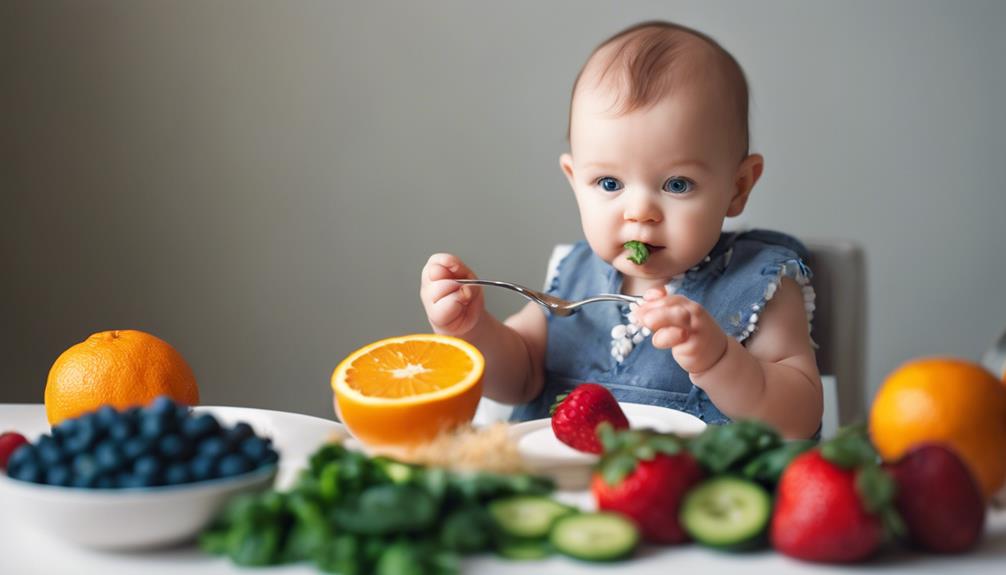
Including antioxidant-rich foods in your 1-year-old's diet can play a vital role in boosting brain health and enhancing cognitive abilities.
Blueberries, colorful vegetables, dark leafy greens, and grapes are excellent choices packed with essential nutrients that support brain function and protect against oxidative stress.
Boosting Brain Health
Boost your 1-year-old's brain health by incorporating antioxidant-rich foods into their diet to support cognitive function and development. Here are three key items to keep in mind:
- Blueberries: These little fruits are a powerhouse of antioxidants that play an important role in protecting the brain from oxidative stress and damage. By including blueberries in your child's diet, you can promote cognitive function and overall brain health.
- Colorful Vegetables: Vegetables like broccoli are rich in antioxidants that are essential for brain cell health and ideal function. Adding a variety of colorful vegetables to your 1-year-old's meals can provide the necessary support for their developing brain.
- Berries: Berries such as strawberries and blueberries are high in antioxidants like vitamin C, which are essential for maintaining brain health. Incorporating these antioxidant-rich fruits into your child's diet can help protect their brain against oxidative stress and free radical damage, supporting their cognitive function and development.
Enhancing Cognitive Abilities
To enhance your 1-year-old's cognitive abilities, introduce antioxidant-rich foods into their diet to support peak brain function and development. Berries like blueberries and strawberries, along with colorful vegetables such as broccoli, are excellent choices. These foods are high in antioxidants, which play a crucial role in protecting the brain from oxidative stress and maintaining ideal brain cell health.
By incorporating a variety of antioxidant-rich foods into your child's meals, you can help support their cognitive abilities and overall brain development. Antioxidants found in fruits and vegetables act as defenders against free radical damage, promoting healthy brain function in toddlers.
Starting early with a diverse range of colorful and antioxidant-rich foods can substantially contribute to your 1-year-old's cognitive growth and development. Remember, providing a balanced diet that includes these beneficial foods can lay a strong foundation for your child's cognitive well-being.
Omega-3 Fatty Acids for Brain Boost

For excellent brain development in your 1-year-old baby, consider incorporating foods rich in Omega-3 fatty acids for a natural brain boost. Omega-3 fatty acids, particularly DHA, play an essential role in brain development and cognitive function. Here are some key sources of these healthy fats to enhance your little one's brainpower:
- Salmon: This fish is an excellent source of Omega-3 fatty acids like DHA, which are essential for brain growth and function in a 1-year-old baby.
- Nuts and seeds: Providing healthy fats that support brain development and cognitive function, nuts and seeds are great additions to your baby's diet.
- Berries: Blueberries, in particular, are high in antioxidants and essential nutrients that protect the brain from oxidative stress, aiding in your 1-year-old's brain health.
Including Omega-3 fatty acids in your 1-year-old's meals can improve mental skills, memory, and overall brain function. So, add these brain-boosting foods to your little one's diet for optimal brain development.
Choline Sources for Cognitive Development

Incorporating eggs into your 1-year-old's diet can greatly enhance their cognitive development due to the rich source of choline found in egg yolks. Choline is essential for memory, brain function, and overall cognitive growth in babies.
The choline from egg yolks plays an important role in forming brain cell membranes and neurotransmitters that are essential for learning and memory processes. By offering fully cooked eggs to your 1-year-old, you make sure they receive the necessary choline for healthy brain development.
Including choline-rich foods like egg yolks in your baby's diet can have a positive impact on their cognitive abilities and brain health. Supporting their brain with adequate choline intake at this critical developmental stage sets a strong foundation for their future cognitive functions.
Remember to introduce a variety of choline sources into your 1-year-old's meals to support their ongoing cognitive growth and overall brain health.
Variety of Brain-Boosting Nutrients
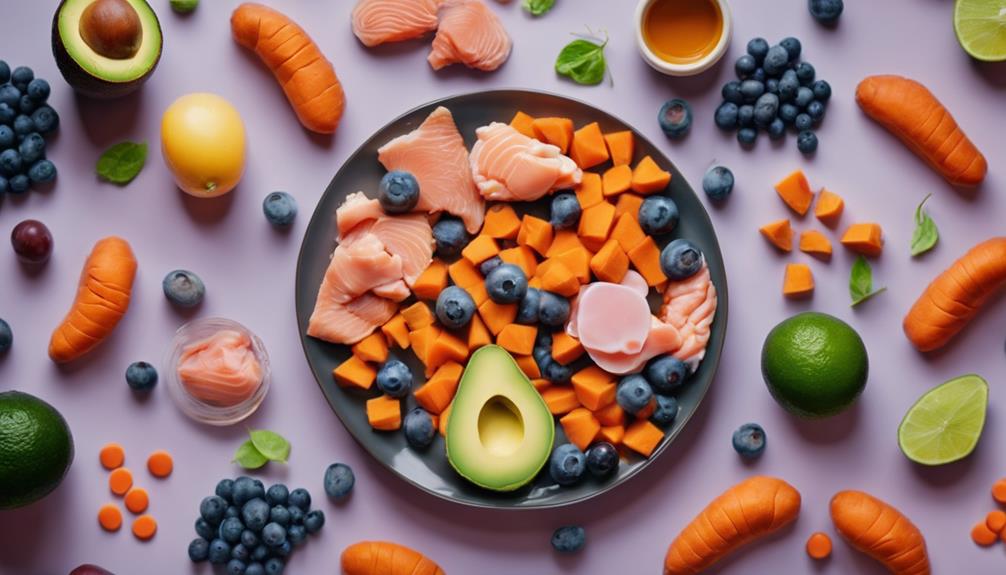
Introduce a mix of brain-boosting nutrients into your 1-year-old's diet to support ideal brain development. Here are three essential nutrients to include:
- Omega-3 Fatty Acids: Incorporate sources like salmon into your child's meals to aid in brain development. Omega-3 fatty acids are important for cognitive function and have been linked to improved memory and focus.
- Iron from Lean Meat: Make sure your little one gets enough iron from lean meats like poultry or beef. Iron is essential for proper brain growth and function as it helps in carrying oxygen to the brain cells, supporting overall cognitive development.
- Choline from Eggs: Eggs are a fantastic source of choline, a nutrient essential for brain health. Choline plays a crucial role in memory and learning processes, making it a valuable addition to your baby's diet.
Nurturing the Growing Brain

To nurture your 1-year-old's growing brain, focus on introducing nutrient-dense foods that support ideal brain cell development. First foods like avocado, Greek yogurt, blueberries, and eggs are excellent choices to aid in brain growth.
Whole grain oatmeal porridge is a good source of essential fiber and protein, important for brain function at this stage. Nut butters can provide healthy fats and protein, which are essential for brain development in your 1-year-old.
Additionally, incorporating foods such as apples, lentils, leafy greens, and salmon into their diet can supply key nutrients like quercetin, iron, and DHA, supporting cognitive growth. Ensuring your child receives these brain-boosting nutrients in creative and appealing ways can further nurture their growing brain.
Frequently Asked Questions
How Can I Improve My Baby's Brain Development at 1 Year?
To boost your baby's brain development at 1 year, focus on brain-boosting foods like salmon and whole grains. Include iron-rich options such as lean meat and beans. Don't forget colorful fruits and veggies for antioxidants. Balance is key!
How Can I Stimulate My 1 Year Olds Mind?
To stimulate your 1-year-old's mind, engage in interactive play, read colorful books, and offer nutritious foods. Create a sensory-rich environment with various textures and colors. Encourage social interactions through playdates and activities to support emotional intelligence.
What Foods Boost Children's Brain?
Looking to boost children's brains? Start with Omega-3 rich foods like salmon and nuts for brain growth. Iron from lean meats and leafy greens supports cognitive development. Don't forget dairy for calcium and protein!
What Are the Top 5 Brain Foods?
To boost brainpower, incorporate salmon, eggs, lean beef, dairy, and berries into your diet. These foods are rich in essential nutrients like DHA, choline, iron, and antioxidants, supporting memory, brain function, and growth in toddlers.
What Fruit Is Good for Toddler Brain Development?
Imagine you're on a quest for brain-boosting fruits. Bananas, blueberries, avocados, oranges, and strawberries are your allies. They arm your toddler's mind with antioxidants, potassium, healthy fats, and vitamin C, forging a path to cognitive greatness.
Conclusion
To sum up, providing nutrient-rich foods such as high-fiber options, calcium-rich choices, antioxidants, omega-3 fatty acids, and choline sources can support the cognitive development of a 1-year-old baby.
By offering a variety of brain-boosting nutrients, you're nurturing the growing brain and setting the stage for excellent brain health.
Remember, feeding the brain is just as important as feeding the body, so make sure to include these key nutrients in your little one's diet to help them thrive and grow.

